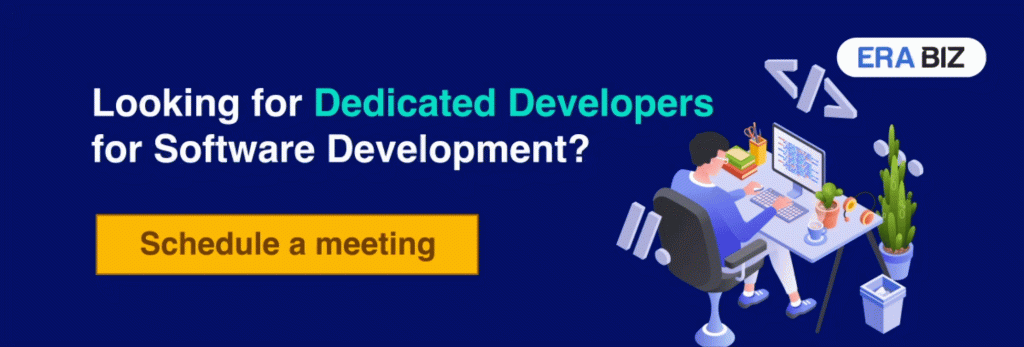In the ever-evolving field of software development, steering a dedicated development project towards success can oftentimes seem like navigating an intricate labyrinth. With intricate timelines, complex requirements, and fluctuating budgets, ensuring project triumph demands a strategic approach and unwavering discipline.

Therefore, as a leading software developer we, at Era Biz Solutions, wished to share our insights on how to keep your dedicated development projects within budget and the necessary tools to masterfully maneuver through the complexities of keeping the projects on track and within financial boundaries.
Laying the Foundation for Success in a Dedicated Development Project
Before embarking on the journey of dedicated development, it is crucial to establish a solid foundation upon which the project will thrive. This entails clearly defining project scope and goals, assembling a capable team, establishing realistic timelines and milestones, crafting a comprehensive project plan, and fostering effective communication channels.
1. Defining Project Scope and Goals: Unwavering Clarity from the Start
The first step towards dedicated development success lies in establishing crystal-clear project objectives and deliverables. Clearly outlined project requirements, meticulously documented and understood by all stakeholders, serve as the guiding light for the entire project. By defining the project scope from the outset, you effectively eliminate the risk of scope creep, ensuring that efforts remain focused on achieving the desired outcomes.
2. Assembling a Capable Team: The Right People, the Right Skills
A dedicated development project’s success hinges on the expertise and dedication of its team members. For example, at Era Biz, we meticulously select and vet experienced and skilled individuals, each possessing a unique set of strengths and talents. By fostering a collaborative and supportive team environment, we ensure that every member feels valued and empowered to contribute their best.
3. Establishing Realistic Timelines and Milestones: Breaking Down from Complex to Simple
Dividing the project into manageable phases, each with realistic deadlines, provides a clear roadmap for progress. In Era Biz Solutions this means we also incorporate some buffer time into the timelines to account for unforeseen delays, which is essential as it ensures that the project remains on track despite unexpected setbacks. This is a form of risk mitigation.
4. Creating a Comprehensive Project Plan: The Blueprint for Success
A detailed project plan serves as the blueprint for the entire dedicated development journey. Outlining tasks, dependencies, and resource allocations provides a holistic view of the project’s scope and complexity. We generally tend to project management tools, such as Gantt charts, mind maps and project boards, quite a lot at Era Biz Solutions. They help us further enhance the project plan’s effectiveness, enabling real-time tracking and adjustments as needed.
5. Establishing Effective Communication Channels: Keeping Everyone on the Same Page
Open and transparent communication among team members, stakeholders, and clients is paramount to project success. Regular status meetings provide opportunities to track progress, address concerns, and celebrate milestones. At Era Biz, we foster a culture of open dialogue, ensuring that everyone remains informed and aligned throughout the project lifecycle.
Navigating the Project Lifecycle: From Initiation to Closure
With a solid foundation in place, the dedicated development project embarks on its journey in full through the initiation, planning, execution, monitoring and controlling, and closing phases.
Step 1: Initiation Phase: Formalizing the Journey
The initiation phase marks the official commencement of the dedicated development project. Finalizing project requirements and deliverables, obtaining formal approvals and sign-offs, and communicating project plans and expectations to all stakeholders lay the groundwork for a successful endeavor.
Step 2: Planning Phase: Charting the Course
The planning phase, which may also be part of the foundation for the project as discussed above, delves into the intricacies of the project. Detailed project schedules and budgets are developed, potential risks are identified and mitigated, and quality assurance procedures are established. Era Biz carefully considers every aspect of the project, ensuring that no stone is left unturned.
Step 3: Execution Phase: Bringing Ideas to Life
With a meticulously crafted plan in hand, the execution phase brings the project to life. Era Biz oversees the implementation of project tasks, diligently monitoring progress against the plan and making adjustments as needed. Addressing issues promptly and proactively prevents delays and ensures that the project stays on track.
Step 4: Monitoring and Controlling Phase: Keeping a Close Eye on Progress
The monitoring and controlling phase involves continuous vigilance over the project’s financial and operational aspects. Tracking project expenses and resource utilization ensures that resources are being allocated effectively. Identifying and addressing deviations from the plan, such as cost overruns or delays, enables timely corrective action.
Step 5: Closing Phase: Celebrating Success and Embracing Lessons
The closing phase marks the culmination of the dedicated development project. Final project deliverables are handed over to clients, project retrospectives are conducted to identify lessons learned, and project documentation and artifacts are archived for future reference. Era Biz believes in continuous improvement, and each project provides valuable insights for future endeavors.
Ensuring Financial Viability: Keeping Costs in Check
Financial viability is a cornerstone of dedicated development project success. Era Biz employs a combination of strategies to ensure that projects remain within budget, from developing realistic project budgets to implementing effective cost management practices to leveraging project management tools for financial tracking.
Developing a Realistic Project Budget: Accounting for Every Expense
Accurate project cost estimation is the foundation of sound financial management. Era Biz meticulously considers every aspect of the project, including:
- Labor costs: Determining the time commitment of each team member and their respective hourly rates is crucial for accurate labor cost estimation.
- Software and hardware: Estimating the costs of software licenses, any hardware purchases, and other necessary tools and resources is essential for a comprehensive budget.
- Third-party services: Identifying and factoring in expenses related to external services, such as cloud infrastructure or API integrations, is vital for complete budget transparency.
- Contingency plans: Incorporating a contingency fund to account for unforeseen expenses helps safeguard the project against unexpected costs.
Implementing Effective Cost Management Practices: Spotting Savings Opportunities
It is important to utilize the most effective cost management practices during development as appropriate for each project, as any changes that may later become necessary can cause costs to rise. So it’s always better to strive to stay below budget. Era Biz employs a range of cost management practices to optimize resource utilization and identify cost-saving opportunities for our clients. Some of the methods we use are:
- Regular expense tracking: Tracking project expenses meticulously allows for real-time monitoring of budget adherence and identification of areas for potential savings. We are able to provide our clients detailed and transparent costing through this.
- Cost-saving initiatives: Actively seeking cost-saving opportunities, such as negotiating favorable vendor contracts for cloud servers and other services or utilizing more efficient development practices, significantly impacts projects done by Era Biz profitably.
- Resource optimization: By optimizing resource allocation by matching team members’ skills and expertise with project requirements, we are able to ensure that project resources are not underutilized or overburdened, leading to cost savings.
Utilizing Project Management Tools for Financial Tracking: Gaining Real-time Insights
Embracing project management tools with robust financial tracking capabilities is essential for maintaining control over project finances. Some of the tools that can be used, and we often use, are:
- Gantt charts: These visual representations of project timelines provide insights into resource utilization, identifying potential bottlenecks or overallocation of resources.
- Budget dashboards: Real-time budget dashboards allow for continuous monitoring of project expenses against the established budget, enabling proactive adjustments to stay within financial constraints.
- Expense reports: Automated expense reports streamline the process of tracking and categorizing project expenses, ensuring accuracy and transparency.
Communicating Financial Information to Stakeholders: Building Trust and Transparency
At Era Biz Solutions, we believe in open and transparent communication with our clients and stakeholders.Part of this is communicating about project finances, which is paramount to maintaining trust and ensuring alignment. We do this through:
- Regular financial updates: Providing stakeholders with regular financial updates, including budget status, cost overruns, and potential risks, fosters a culture of transparency and accountability.
- Proactive communication: Addressing budget concerns promptly and transparently demonstrates Era Biz’s commitment to financial management and stakeholder satisfaction.
- Seeking stakeholder approval: Prior to making significant changes to the project budget, Era Biz seeks stakeholder approval, ensuring alignment and commitment to financial goals.
Managing Client Expectations: Setting Clear Guidelines
Through all our experience over the past 12 years at Era Biz Solutions, we understand that managing client expectations is a key factor in a dedicated development project. Establishing proper understanding regarding project costs and deliverables is crucial for managing client expectations. For this you need to manage:
- Detailed budget and scope definition: Providing clients with a clear and detailed project budget, outlining the scope of work and associated costs, sets the stage for realistic expectations.
- Ongoing communication: Maintaining open communication with clients throughout the project lifecycle, addressing questions and concerns promptly, helps manage expectations and foster trust.
- Transparent pricing: Providing transparent pricing mechanisms, including fixed-price contracts or time and material agreements, clearly communicates the financial implications of the project.
By adhering to these principles, You too can consistently ensure that your dedicated development projects stay on track, within budget, and exceed expectations. At Era Biz Solutions, our commitment to strategic planning, effective communication, and astute financial management has earned us a reputation as a trusted partner in the software development industry.

If you wish to hire dedicated developers from us for your project, please book a free consultation through our Contact Us page!

hwuiKqFWYoTgUtM
Hi there! Do you know if they make any plugins to assist with SEO?
I’m trying to get my website to rank for some targeted keywords but I’m not
seeing very good success. If you know of any please share.
Cheers! I saw similar article here: Eco blankets
how can i buy priligy in usa Cancer Epidemiol Biom Prev
Howdy! Do you know if they make any plugins to help with SEO?
I’m trying to get my website to rank for some targeted keywords but I’m not seeing very good gains.
If you know of any please share. Kudos! I saw similar article here:
Code of destiny
I am extremely impressed with your writing skills as smartly as with the format on your weblog. Is this a paid topic or did you modify it yourself? Anyway keep up the nice high quality writing, it’s rare to see a nice blog like this one nowadays. I like erabizsolutions.io ! Mine is: Madgicx
I am really inspired with your writing abilities and also with the format on your weblog. Is this a paid theme or did you customize it your self? Anyway keep up the nice high quality writing, it’s rare to look a nice blog like this one today. I like erabizsolutions.io ! It is my: TikTok ManyChat